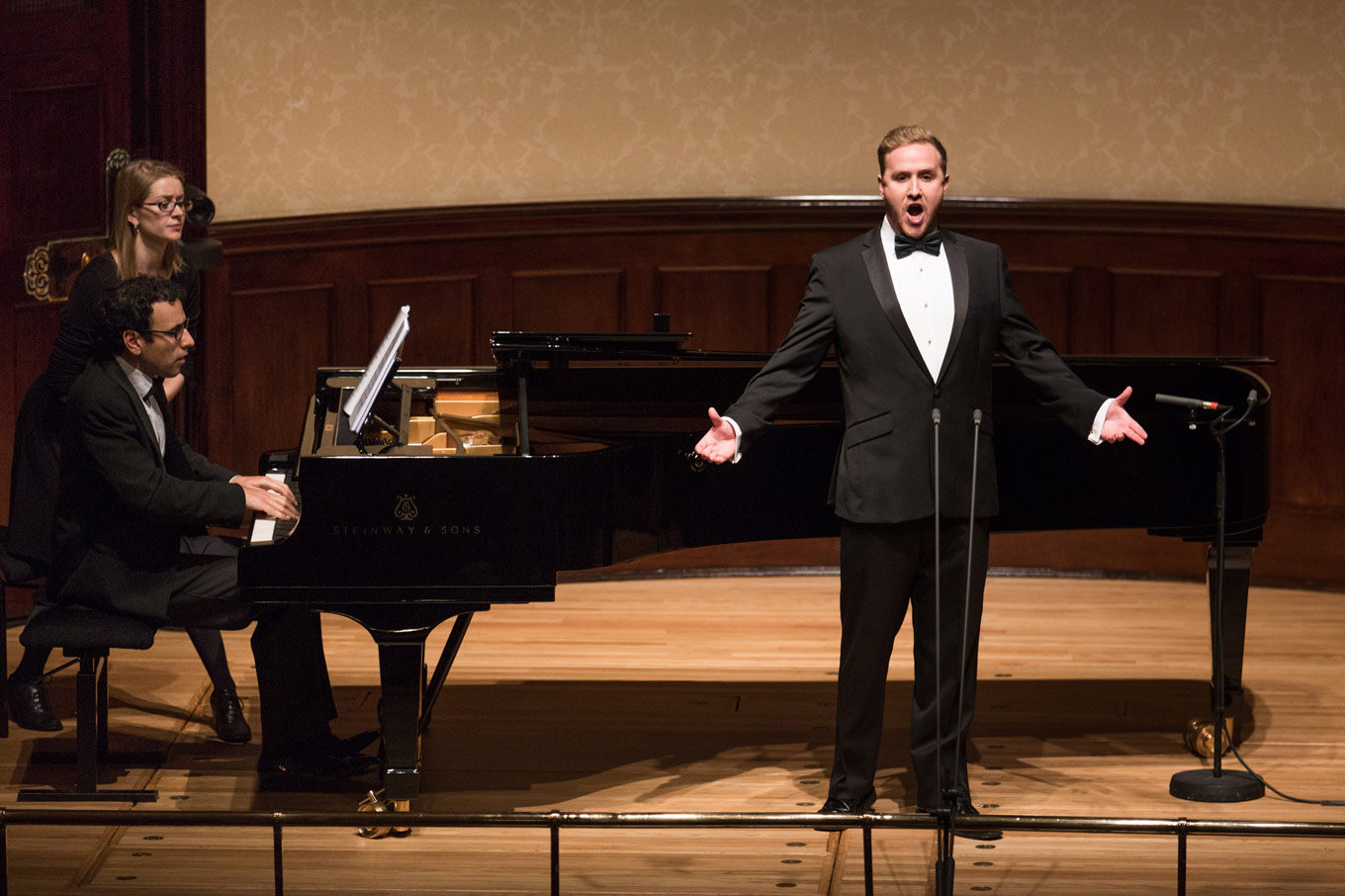
In review: "Sophisticated, precise fearlessness" at Wigmore Hall
ReviewLast night was a unique and wonderful evening at the Wigmore Hall. This year’s Wigmore Hall/Kohn Foundation Intenational Song Competition was a very rewarding evening full of incredible music making. The young performers must present recitals of 30 minutes each, consisting of songs in any language - they must also include at least one song written after 1950. This year’s finalists presented four completely contrasting programs - they were also four very different pairs of musicians.
The evening began with John Brancy and Peter Dugan, who happened to be my personal favourite pair of the evening. They had a huge range as an ensemble - at moments the music was incredibly intimate and at others, bold and commanding. Brancy has the air of a young man who finds joy in singing. He was spontaneous and captivating, with a remarkably well produced voice that still had exciting wildness in it. Dugan particularly shone in the quiet and delicate moments, having a touch that was moving in its sensitivity- this particularly shone in Bernstein’s “To what you said…” This was the highlight of their programme for me, delivered with remarkable sensitivity and maturity. Over all, their selection of repertoire was unusual, which suited this writer, though it may not have pleased everyone. It was particularly bold to not perform a song by Schubert, or even Schumann - instead they performed a pair of pieces with German text by Carl Orff which showed off the full dramatic ability of the duo.
Josh Quinn and You Zhao followed with yet another unconventional program. They began with Wolf where Quinn showed his lovely rich voice. For my taste, he came off his breath at times, losing both intensity and a little bit of pitch integrity. However, he was still an engaging and expressive performer with a bright stage presence. After the Wolf, they presented pair of Charles Ives songs in a manner that was both dramatic and forthright, navigating the enigmatic corners with ease. Zhao played with bold angularity- she had an expansive and intense sound which impressed in the Ives. Their performance of Duparc’s “Le galop” left something to be desired from both - it didn’t feel as exciting as it should have. Both performers were very musical and intelligent in their choices, tackling a complex program with tactile enthusiasm and bold sweep.
The third duo to perform were Clara Osowski and Tyler Wottrich - it was a nice change to hear a female voice in the evening! Their program was a little more traditional, with more Schubert and Schumann. Their performance was very warm and atmospheric. Wottrich provided a cushion of sound and Osowski floated easily on top. Unfortunately, the programme was all quite similar in its range of dynamic and emotional expression and I felt we never got to hear Osowski’s full voice. Her instrument was warm, rich and I could hear the hint of power with a rich bottom and a silvery top. Particularly, their performance of Howell’s King David was lovely. It was remarkably elegant while managing to be sincere and moving- the audience was undeniably captured.
To finish the evening, we heard from the winners, Julien Van Mellearts and Gamal Khamis. They were wonderful from the beginning. As a pair, their sound was clear and bright and their music making was very detailed. Van Mellearts had a fantastically even, easy sound which was paired with wonderfully clear text. Khamis was similarly precise, while remaining warm and playing with a wide range of colours. They duo shone throughout their programme, but there were several things that were especially remarkable. Schumann’s “Mondnacht” was wonderful: it was very clear and detailed in its execution, yet somehow completely tender and mysterious. Their performance of Britten’s “Proverb IV” and “The Tyger” from Songs and Proverbs of William Blake was also fantastic These amazing songs are a real challenge to performers because of their musical complexity. Their presentation was thrilling: full of excitement paired with foreboding. They used a huge range of colour and shaping to create a world of sound. Their programme finished with an unusual and wonderful song cycle by Debussy. His Trois ballades de François Villon are rarely performed.

Van Mellearts sang with real attention to detail and character, working against the harmony in all the right places. Khamis really shone here - his playing was incredibly colourful, bringing together all the disparate elements of the piano writing. It was easy to see why this pair were ultimately selected as the winners. They presented an incredible programme of music with a sophisticated, precise fearlessness that filled Wigmore Hall.
This year’s Wigmore Hall Song Competition was a wonderful experience. The judges commented on the incredibly high standard of this year’s performers. I completely concur. The level of music making was very refined and intelligent. It was wonderful to see a concert with such a wide range of repertoire performed by young musicians making bold and individual choices. Over all, it would have been nice to hear some other voice types, but it was easy to see why all the finalists were selected. I do have to remark that I was surprised the prizes were awarded to the singers alone - it seems a song competition should be about the duo from beginning to end.


Comments